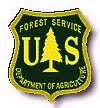We had now been about five days on the fire. It had been considered fully contained. But here was still work to do before we could leave the fire line. We had gone all this time without bathing or changing our clothes. We were all dirty, smokey and bone tired. But we still had to do "Mop Up." This was when you go into burned areas and look for anything that is still burning and could reignite the fire.
The burning stumps were the hardest to deal with. If it was from a pine tree, the stump and roots had plenty of pitch and tar to keep burning for weeks. You would have to chop at it with your Pulaski tool. This tool was half axe and half pick. Other tools we used was the brush hook and the McCloud (half rake, half hoe) and, of course, the shovel.
Chain saws were beginning to be used. But they were still too big and bulky to be used for the work we were doing. The brush hook was our elite tool. It lead the way. Cutting at a 60 degree angle, it could fell a four inch diameter tree in one swing. The Pulaski came second finishing off what the brush hook started and attacking the root system. Next came the shovels clearing brush and vegetation. Last but not least came the McCloud. With the raking and hoeing motion you got the area down to dirt.
The burning stumps were the hardest to deal with. If it was from a pine tree, the stump and roots had plenty of pitch and tar to keep burning for weeks. You would have to chop at it with your Pulaski tool. This tool was half axe and half pick. Other tools we used was the brush hook and the McCloud (half rake, half hoe) and, of course, the shovel.
Chain saws were beginning to be used. But they were still too big and bulky to be used for the work we were doing. The brush hook was our elite tool. It lead the way. Cutting at a 60 degree angle, it could fell a four inch diameter tree in one swing. The Pulaski came second finishing off what the brush hook started and attacking the root system. Next came the shovels clearing brush and vegetation. Last but not least came the McCloud. With the raking and hoeing motion you got the area down to dirt.
Let's see, we were mopping up the area. If we couldn't completely stop the stump from burning, we would cover it with dirt to smother the fire and prevent sparks from escaping. We did our mop up operation as we advanced down the mountain toward the fire camp. We arrived off the mountain in the early afternoon. As soon as we approached the camp, we picked up the smell of smoke in the air. But this was a good smell of steaks cooking. The mess tent was set up and operated by the convicts. We just called them "cons". They were brought them in to do the cooking and also to fight fires. They were excellent at both jobs. We had been eating C-rations for five days and the smell of real food almost caused a panic in the ranks.
Like I said before, we had not bathed for the past five days and there were no shower facilities at fire camp. But some of the other crews had discovered what this area did have, hot springs, Willet Hot Springs, to be exact. Nature's own hot tub. For tired aching muscles, this was a Godsend. All you saw was a trail of dirty jeans, shirts, socks, boots and yes, underwear. It was definitely skinny dipping time. In God's Country were all "al natural" and loving it. Soaking in that hot water after five days of dirt and smoke was almost spiritual in nature.
After the "Johnny Cash Fire," we adopted his "Ring of Fire," as our crew's official song. Paul, our crew leader, declared if we heard his song on the radio, we'd be going out on a fire. Remarkably, it turn out to be fairly accurate.
In closing, I want to mention and pay tribute to the twelve members of the El Cariso HotShot crew who died on Novemeber 1, 1966. We worked with this crew on several occasions and on a fire in the Cleveland National Forest. That was their home base. We all felt a kinship with the crew. May they rest in peace.


















